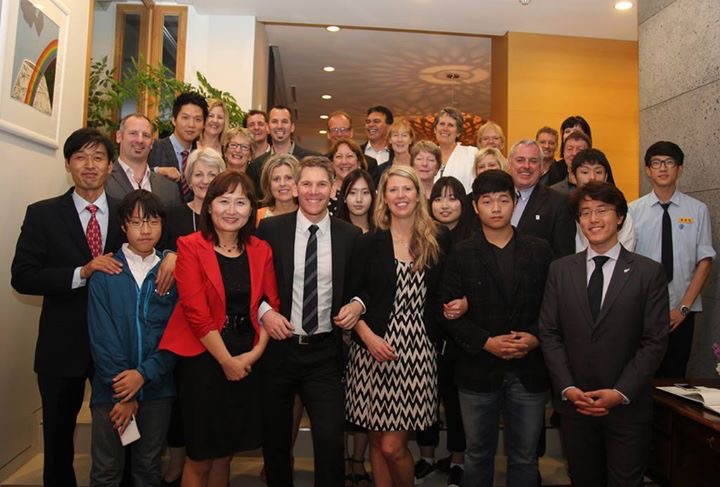30 September 2015 at 9:00 am
Tauranga-based group visits Korea
A group of international education providers from Tauranga visited Korea recently to make connections and promote their region’s offerings.

E-News caught up with one of the organisers of the visit, Education Tauranga’s Anne Young.
What led to the decision to visit Korea as a group of institutions?
Education Tauranga’s 2013-2017 strategy focuses strongly on collaboration between member institutions. We find that we can make more of an impact in a market as a group, and, with a diverse range of institutions participating in activities, we can demonstrate the pathways that exist within our region to cater for all levels of education.
Korean students are enrolled in the full range of education institutions in Tauranga – from primary right through to tertiary. This is one of the reasons Education Tauranga’s Korean student numbers have continued to rise in 2015, while declining in New Zealand overall. We also attribute our success in Korea to the fact that we have committed local agents, strong local government support, highly effective links with the Korean community in the Western Bay of Plenty and institutions that provide excellent education and care to all international students, including those from Korea.
In choosing Korea as our group visit destination, we were able to further capitalise on our already strong position in that market.
What are the advantages of a group visit such as this?
The main advantage of a group visit is that it’s easier to get noticed and to secure meetings than when you’re an individual institution travelling on your own. Promotional costs can be shared, too. In our case, 21 institutions were pitching in, meaning our advertising dollar went a lot further, resulting greater numbers of prospective students at our fairs and good attendance of officials at other events.
Having trip organisers taking care of all the planning, organising and bookings meant it was a much more efficient process for everybody. It also alleviated stress for some first time travellers to Korea who didn’t have to face many of the challenging ‘unknown factors’ that can pop up when organising your own recruitment trip.
What are the downsides?
I don’t think there are any particular disadvantages to marketing as a group offshore. However, there are challenges in the logistics of dealing with such a large group, such as transport arrangements and getting everyone to where they need to be on time, as well as ensuring that planned activities are of benefit to all institutions from a range of sectors.
What were the highlights?
We attracted over 400 prospective students through our fairs which was a great success for one small region of New Zealand. The students who came along were already pretty well informed about Education Tauranga’s education offerings, demonstrating that the effort that we put into advertising prior to the events hit the mark!
Several alumni families also attended the events, and it was wonderful to see them engaging with prospective students and their families and giving their perspective on what studying in our region is like.
The support of big New Zealand brands such as Zespri was also fantastic; their product promotion at our fair went down really well.
Being hosted at the New Zealand Residence by the Deputy Head of Mission to Korea and Education New Zealand was also a highlight as we were able to recognise the contribution they had made to ensuring our activities were a success.
Are there any outcomes on the horizon or promising connections made?
We’re hoping our visit will result in an increase in student numbers from Korea in 2016. The signs are promising so far, with many new students expressing an interest in coming here. Time will tell however!
We have also strengthened relationships with Tauranga’s ‘friendship city’ of Ansan, with a larger study tour group coming in 2016 than came in 2015.
What would you do differently next time?
The visit to Korea was our second regional group visit (we visited China together as a group in March this year) so we already had experience in what did and didn’t work and were able to iron out any issues prior to this trip.
Any hints and tips for together groups thinking of undertaking this sort of group visit?
I think undertaking a visit of this kind is very effective for regions or groups of institutions. My top tips for making your visit a success are as follows:
-
Do your research and have a plan. Know exactly what activities you want to do and why
-
Involve all participating institutions in the planning process
-
Make sure you have support from local councils and your Economic Development Agency
-
Enter the market with a strong brand that all participants believe in
-
Make sure you have translated materials and have translators who know your product/region
-
The work you do prior to arrival is just as important (if not more than) as the work you will do while in country
-
Work with ENZ and local Embassy staff
-
Leverage your alumni
-
Follow up with the people you met with during the visit!


